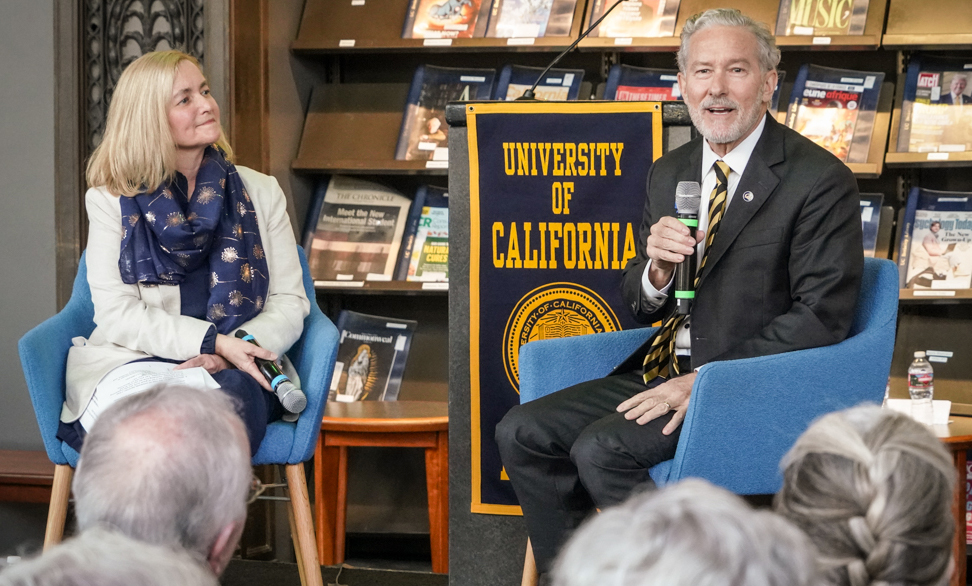
UC Berkeley is a truly exceptional place.
Not convinced? Perhaps you haven’t met Rich Lyons yet.
This month, supporters of the UC Berkeley Library filtered into the Roger W. Heyns Reading Room for a meeting of the minds. More than 260 guests, a record-high turnout, listened with rapt attention as a conversation, the centerpiece of this year’s Luncheon in the Library, unfolded in Doe Library between Chancellor Lyons and University Librarian Suzanne Wones.
With ease and enthusiasm, Lyons — UC Berkeley’s booster-in-chief, and the first undergraduate Cal alum to become Chancellor — painted a picture of the university, its strengths, and its opportunities.
To wit, it’s nearly unrivaled as an engine for upward mobility, he said. Its alumni create more businesses than any other university. And it provides equitable and broad access to a world-class education. (Still not convinced?)
“No private university educates at our scale,” said Lyons, who formerly served as dean of UC Berkeley’s Walter A. Haas School of Business. “And no public university researches at our quality. …
“Berkeley is that remarkable.”
Lyons and Wones started in their new roles on the same day last summer, and have already struck a tone that honors the university’s long tradition of excellence while embracing change.
In their far-reaching discussion, the leaders talked about what sets UC Berkeley — and the Library — apart, music as meditation, and the power of belonging.
Here are three things we learned.
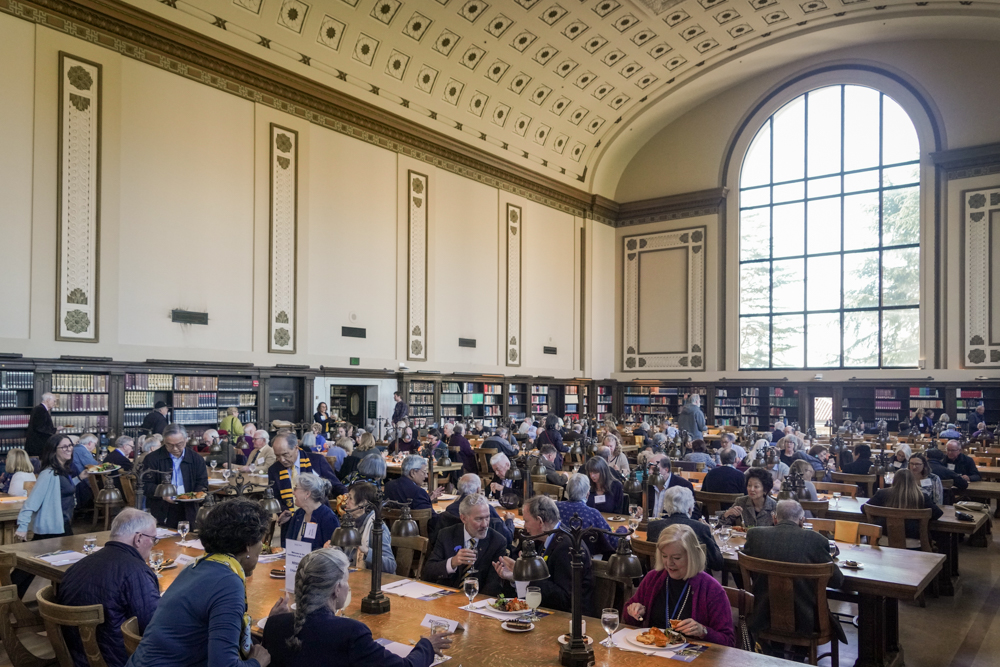
1. Research is in Berkeley’s — and Lyons’ — DNA.
The research that happens at UC Berkeley changes the world, Lyons said.
James P. Allison’s Nobel Prize-winning work at UC Berkeley helped revolutionize how cancer is treated. Contributions from sociologist Arlie Hochschild, philosopher Judith Butler, and many other luminaries at Berkeley have rippled well beyond their fields. (Lyons recalled taking Hochschild’s class as a student at Cal. “She just blew my mind,” he said.)
Research, Lyons said, is at the heart of what makes Berkeley great.
“It’s so thrilling,” he said. “It’s like a lifelong love affair with ideas and learning.”
When discussing his own pioneering research, Lyons’ enthusiasm soared. Lyons earned his business degree at Berkeley in 1982 and came back to join the faculty in the ’90s, earning a Distinguished Teaching Award in 1998. From his research on exchange rates, or the price of goods and services between countries, emerged an idea that he “basically got tenure for,” he said.
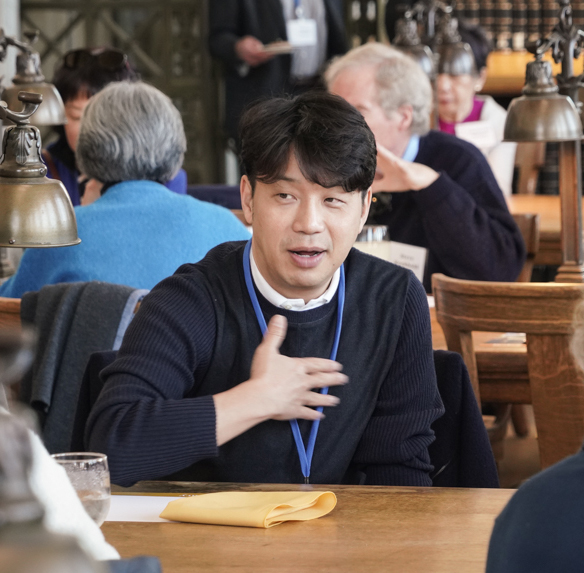
By examining trades between banks over time — and taking note of whether a transaction was initiated by the buyer or seller — Lyons revealed a microeconomic explanation for how exchange rates are determined. Previously, the phenomenon had been described in terms of macroeconomic forces, which include inflation rates, interest rates, and the like.
“It’s like you’re a biologist in a world with no microscopes, and somebody hands you a microscope, and says, ‘Check this out!’” he said. “It was that fun, intellectually.”
The audience erupted in applause after the energetic economic excursion, a mini lecture displaying Lyons’ dexterity in making dense topics not only understandable but exciting.
“The thing that really grabbed my attention was his research,” said Michael Jeon ’99, a guest at the luncheon whose work for an overseas fund made that part of the discussion particularly relevant. Jeon, a new member of the Council of Friends of The Bancroft Library, also noted the “fireside”-style Q&A format was a natural, inviting way to get to know the leaders.
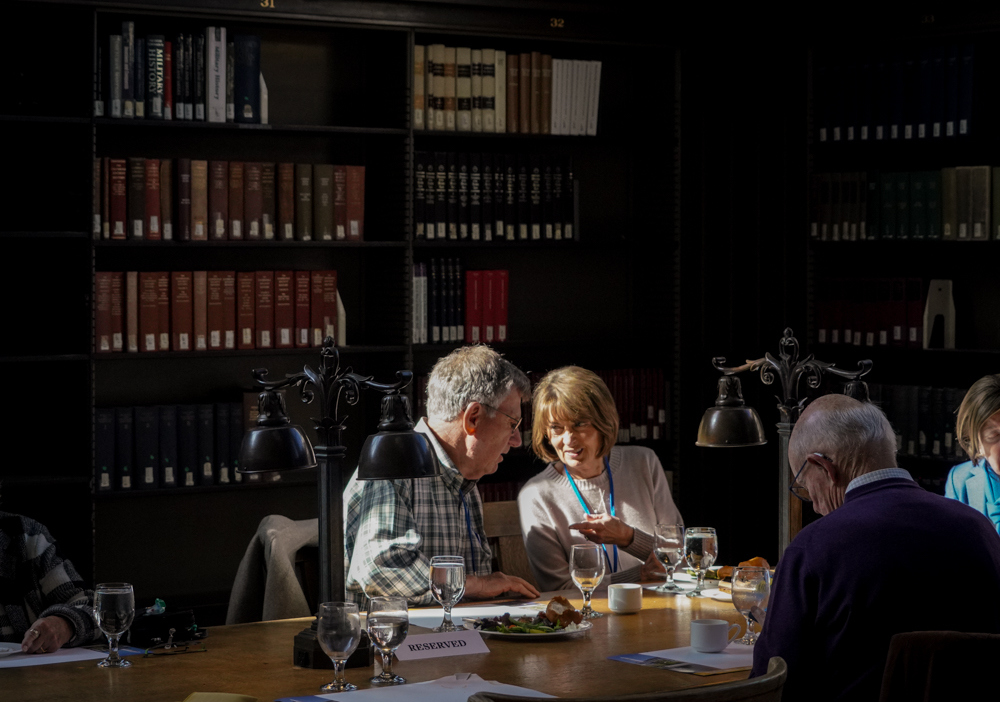
2. Music is meditation.
It’s no secret that Lyons loves music. In fact, it’s his “biggest avocation,” he said.
Lyons has performed everywhere from Berkeley’s downtown farmers market, where he strummed, stomped, and sang the Rolling Stones’ “Sympathy for the Devil,” to the university’s Golden Bear Orientation, where he turned in a spirited rendition of “The ‘Bear’ Necessities,” a Jungle Book classic with a cheeky Cal nod. On the cover of a recent issue of California magazine, he stands before Doe Library, Martin six-string in hand.
Lyons took up guitar as a grad student at the Massachusetts Institute of Technology, inspired by a street musician he would see in Harvard Square. (After attending Berkeley, Lyons went on to pursue his Ph.D. in economics at MIT.) Playing music, Lyons said, provided an escape during a time in his life that he described as “hopelessly unbalanced.”
For Lyons, music is not just a passion, but a respite. Each day, he plays his acoustic steel-string guitar at least a little bit.
“We all need a decompression — we all need a meditation in our lives,” he said. “That’s my meditation.”
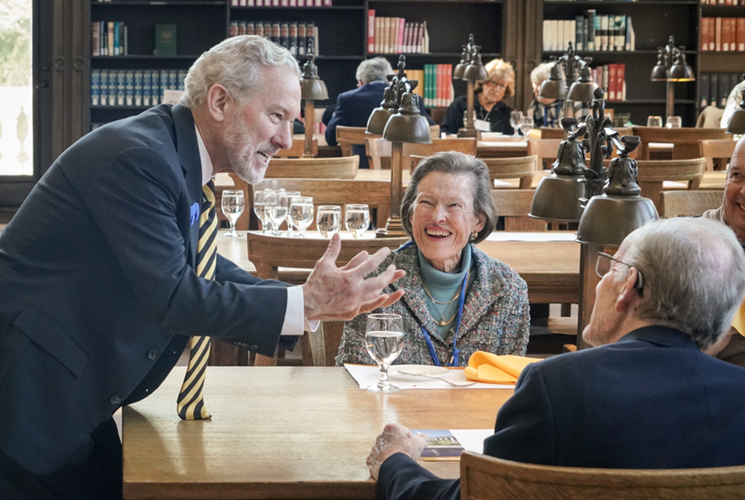
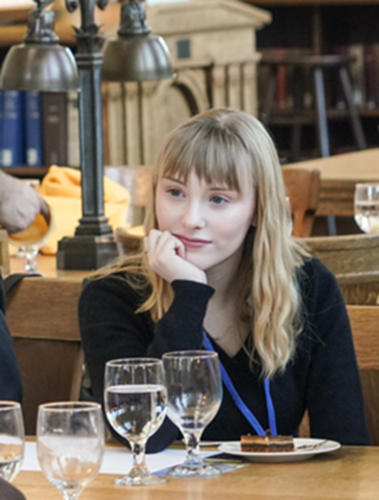
3. Belonging matters.
Ensuring that students feel a sense of belonging is not only right — it’s a requirement if the Library wants to successfully serve its mission, Wones said.
The Library is a fountain of knowledge — a provider of massive amounts of information, and friendly support to help make sense of it all. But none of that matters if students don’t feel welcome, she said.
“We have to be really intentional about how we present ourselves to the students and make sure they know that they belong here, that all their questions are welcome here, that they can ask anything of our staff, and we will help them find the information that they need,” Wones said.
For Lyons, the influence of leaders on an organization’s culture is something of an “obsession,” he said. Belonging is among the most important aspects of culture, he said, and a topic that demands careful attention.
“We need to be fair,” he said. “We need to be thoughtful.”
The conversation between Lyons and Wones resonated with Madie Neely, who was among a group of students in the Sligo Scholars program eating together under the vaulted ceiling of Doe Library’s North Reading Room, where guests had gathered for lunch. (“It’s really pretty,” Neely said of the library, which, as a student at University of the Pacific, in Stockton, she had never visited before.)
“It’s exciting to see the university dedicated to a student-centered experience, and all the good they’re up to,” said Neely, who studies English and philosophy.
“It was really nice,” she said.
The Luncheon in the Library is a private, invite-only event honoring Library supporters. Past speakers include Rita Moreno, dancer, singer, and actress; Carol Christ, former chancellor of UC Berkeley; and Dorothy Lazard, author and librarian.